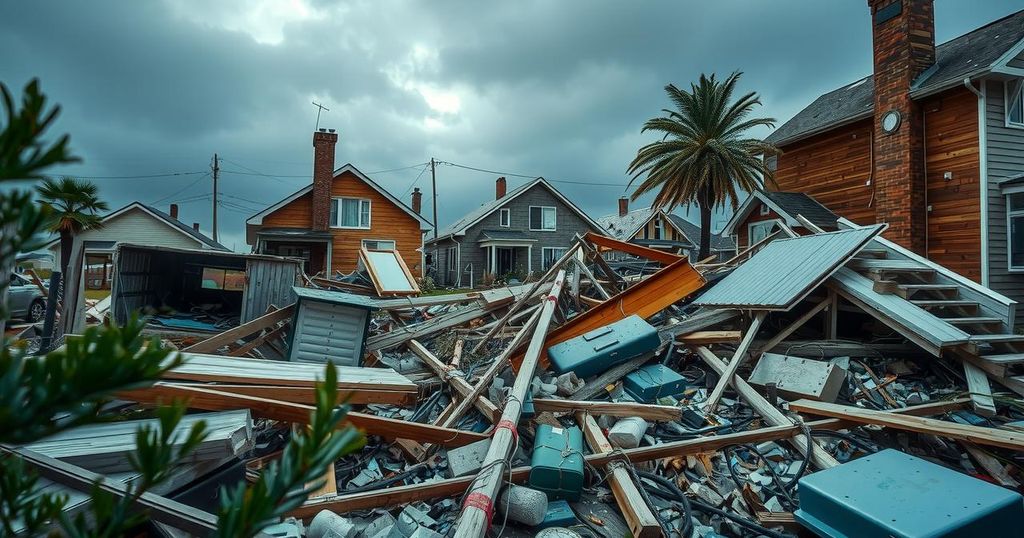2024 Atlantic Hurricane Season Ends with Record Damage and Devastation

The 2024 Atlantic hurricane season concluded with 11 hurricanes, significantly above average, resulting in extensive damage, particularly from Hurricane Helene, the deadliest storm since Katrina. The season featured record-breaking storms, including the earliest Category 5 hurricane and unprecedented rainfall, raising concerns about the impact of climate change on hurricane frequency and intensity. The overall devastation highlights the urgent need for improved preparedness against these increasingly severe weather events.
The 2024 Atlantic hurricane season concluded recently, marked by unprecedented activity that included 11 hurricanes, surpassing the typical average of seven. This season resulted in widespread devastation, particularly in areas far from where these storms made landfall along the U.S. Gulf Coast. Meteorologists characterized this season as exceptionally active, primarily due to unusually high ocean temperatures, which significantly influenced the frequency and intensity of hurricanes.
Among the notable storms was Hurricane Beryl, which emerged as the first recorded Category 4 hurricane in June, impacting Carriacou in Grenada. This storm severely affected Jamaica, resulting in the destruction of crops and numerous homes, ultimately claiming two lives. Its unusual early development paved the way for it to escalate into a Category 5 hurricane by July 1, a remarkable occurrence as major hurricanes are not expected until September 1.
Hurricane Helene, which struck the southeastern United States in September, became the deadliest hurricane to hit the mainland since Hurricane Katrina in 2005, with over 200 fatalities. North Carolina estimated damages at approximately $48.8 billion, affecting housing, water systems, and agricultural lands across several states, including Florida, Georgia, South Carolina, Tennessee, and Virginia.
In October, Hurricane Milton gained sustained winds of 180 mph, marking it as one of the strongest hurricanes based on wind speed observed in the Gulf of Mexico, second only to Hurricane Rita from 2005. The intense rainfall brought by both Helene and Milton led to record wetness in cities such as Asheville, Tampa, and Orlando for the months of September and October.
By November, Hurricane Rafael achieved wind speeds of 120 mph, nearing the strongest November hurricane record in the Gulf of Mexico. Its landfall in Cuba compounded the challenges already posed by previous hurricanes.
The relationship between the hurricane season and climate change is evident, as rising temperatures from greenhouse gases facilitate the formation of hurricanes at unusual times and locations. As noted by hurricane researcher Brian McNoldy, these conditions have raised the likelihood of more extreme weather events: “I do not ever point to climate change as causing a specific weather event, but it certainly has its finger on the scale and makes these extreme storms more likely to occur.”
The Atlantic hurricane season, typically running from June 1 to November 30, is a critical focus for meteorologists and communities prone to severe weather. It is characterized by variable activity, influenced by several factors, including climatic conditions such as ocean temperatures and atmospheric pressure. The past season signifies a noteworthy trend towards increased hurricane frequency and intensity, intricately linked to climate change. Understanding this season’s distinct events can provide insights into future storm activity and the potential for extensive damage.
The 2024 Atlantic hurricane season has concluded, highlighted by record hurricane activity and significant destruction across multiple regions. The toll of hurricanes such as Beryl, Helene, Milton, and Rafael underscores the pressing connection between climate change and increased hurricane intensity. These phenomena not only cause loss of life but also result in staggering economic impact, prompting a reevaluation of preparedness and response strategies for future hurricane seasons. The insights gathered from this year’s season are critical for refining interventions and addressing the challenges posed by evolving climatic patterns.
Original Source: www.wtvr.com






